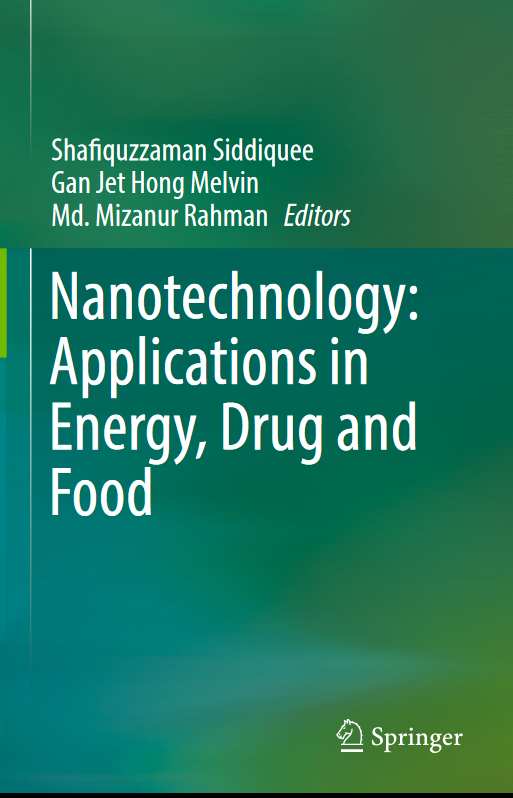Newly released
This book is new and will be uploaded as soon as it becomes available to us and if we secure the necessary publishing rights.

Nanotechnology: Applications in Energy, Drug and Food Book PDF
(0)
Author:
shafiquzzaman siddiqueeNumber Of Reads:
65
Language:
English
Category:
TechnologySection:
Pages:
440
Quality:
excellent
Views:
812
Quate
Review
Save
Share
Book Description
Applications of nanotechnology are the remarkable sizes dependent on physiochemical properties of nanomaterials that have led to the developed protocols for synthesizing nanomaterials over a range of size, shapes and chemical compositions. Nanomaterials are normally powders composed of nanoparticles which exhibit properties that are different from powders. Nanotechnology is the engineering of functional systems at the molecular scale with their wide applications in energy sector, including -but not limited to- energy resources, energy conversion, energy storage, and energy usage; drug delivery systems including- safety concerns, perspective, challenges, target therapeutics for cancer, neurodegenerative diseases and other human diseases, nanomaterials based tissue engineering; and food sectors including to- food safety and quality, opportunities, challenges, nanomaterials based enhancing food packing, and determination of foodborne pathogens, agro and marine food, analysis of market, regulations and future prospects.
The utilization of nanotechnology in the energy field will be emphasized and highlighted, in accordance to their prominent and high impact in this particular field. Recent trends and significant benefits of nanotechnology in the energy field will be revealed to the readers, and their promising advanced applications will be discussed.
The current drug discovery paradigm constantly needs to improve, enhance efficiency and reduce time to the market on the basis of designing new drug discovery, drug delivery and pharmaceutical manufacturing. In this book will be highlighted nanotechnology based drug delivery is an important aspect of medicine, as more potent and specific drugs that are particularly discussed the understanding of disease pathways. Several biomaterials can be applied to small-molecule drugs as controlled release reservoirs for drug delivery and provide new insights into disease processes, thus understanding the mechanisms of action of drugs.
Applications of food nanotechnology are an area of emerging interest for the food industry, for the reason, in this book will be given more priority to discuss the uses of nanomaterials for food packing, food safety and quality, and to remove the contaminated or spoiled by foodborne pathogens. And also nanotechnology based food products will be discussed how making them tastier, healthier, and more nutritious such as vitamins, to reduce fat content, and to ensure they do not degrade during a product’s shelf life.
Nanotechnology is basically the uses of nanomaterials, devices and systems through the control of matter on the nanometer scale. Multidisciplinary studies are required the technology for discovery and moving so fast from concept to the reality. Nanotechnology always not only provided more benefits in energy, drugs and food products but also provided significantly benefits around multidisciplinary field applications.
shafiquzzaman siddiquee
Shafiquzzaman Siddiquee is an associate professor in the Biotechnology Research Institute of Universiti Malaysia Sabah (UMS), Malaysia. Dr. Siddiquee obtained his MSc (Molecular Microbiology) and PhD (Bioelectrochemistry) degrees in 2008 and 2010, respec- tively, from University Putra Malaysia (UPM), Malay-sia. In 2011, he received a Best Post Graduate Award from UPM for being the most outstanding postgraduate student of the year. In 2014, he was the winner of the ProSPER.net-Scopus Young Scientist Award in the cat-egory of Sustainable Agriculture. He served as a guest professor at the Institute of Analytical Chemistry, Chemo- and Biosensors of the Regensburg University, Germany, in 2016. Currently he is a head of the UMS Biosensor Research Group. He has involved in varying types of research areas such as chemosensors- or biosensors-based research, management of food wastes, and Trichoderma biodiversity and its applications. He has published over 85 refereed journal articles, 4 books, 12 book chapters, and 38 proceeding papers. His find-ings yielded, so far, 4 patents, 5 invited speaking engage- ments, and 40 research awards, including notable award of MOHE entrepreneurial Project Award 2015 and International Conference and Exposition on Inventions by Institutions of Higher Learning 2015 (PECIPTA 2015). Dr. Siddiquee has established relevant research group networks both nationally and internationally. In pop culture, Dr. Siddiquee’s findings have been broad-cast in national (Malaysia) TV stations (TV1, TV2, and TV7) as well as highlighted in various print media.
Book Currently Unavailable
This book is currently unavailable for publication. We obtained it under a Creative Commons license, but the author or publisher has not granted permission to publish it.
Rate Now
5 Stars
4 Stars
3 Stars
2 Stars
1 Stars
Nanotechnology: Applications in Energy, Drug and Food Quotes
Top Rated
Latest
Quate
Be the first to leave a quote and earn 10 points
instead of 3
Comments
Be the first to leave a comment and earn 5 points
instead of 3